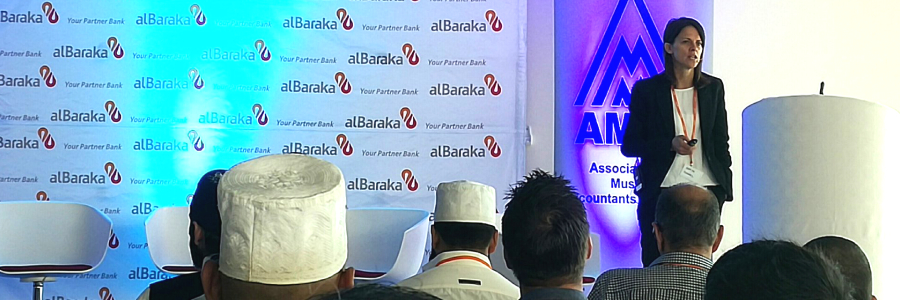On the 21 April, Al Baraka Bank in association with the Association of Muslim Accountants and Lawyers (AMAL) hosted a conference on Cryptocurrency, Blockchain and the Islamic Perspective, in Durban. Speakers included Dr. Arif Ismail, Head of Fintech at the South African Reserve Bank (SARB), Justin Clarke, Co-Founder of Private Property and One Africa Media and Chairman of Wealth Migrate, Nicholas Allen, Co-Founder and CEO of Avantcore, Nevellan Moodley, Associate Director and Blockchain Lead at KPMG, Mufti Faraz Adam, Director of Amanah Finance and consultant specialising in Islamic Finance and MD of the Blockchain Academy, Sonya Kuhnel. Sonya kicked off the conference by providing an overview of cryptocurrencies and blockchain technology and what some of the use-cases such as self-sovereign identity, voting, land and title deeds and cross-border payments. Nicholas Allen, talked about the blockchain disruption to business and how businesses are currently using this technology.
Arif Ismail, provided an interesting perspective from a regulator standpoint on regulating cryptocurrencies such as bitcoin and what the real risks are to consumers in South Africa. Arif said that the SARB is in the process of developing regulations to address concerns in the FinTech industry, however the regulatory position of the SARB is still “use at your own risk” as per its 2014 position paper on virtual currencies. To date, the SARB have been very proactive in meeting with businesses and startups in the blockchain space to understand not only the risks cryptocurrencies pose but also the tremendous number of opportunities. Arif is head of the SARB FinTech unit especially tasked to look at this technology and provide regulatory guidance in future.
Justin Clarke then discussed how his company Wealth Migrate, have used blockchain technology in the global property market.
Mufti Umair Patel, Shaykh Joe Bradford, Mufti Faraz Adam and Shaykh Mahomed Shoaib Omar discussed the Islamic perspective on cryptocurrencies and if in fact they can be considered Sharia compliant. In conclusion, the speakers on the Islamic perspective did view cryptocurrencies Sharia compliant.
The last session of the day, was the panel with Justin Clarke, Sonya Kuhnel, Nicholas Allen, Nevellan Moodley and Mufti Umair Patel. The audience asked the panelists various questions from how the rest of the world’s regulators view bitcoin, if cryptocurrencies will disappear, to ICO scams and risks, to the importance of blockchain the technology versus bitcoin the cryptocurrency.
